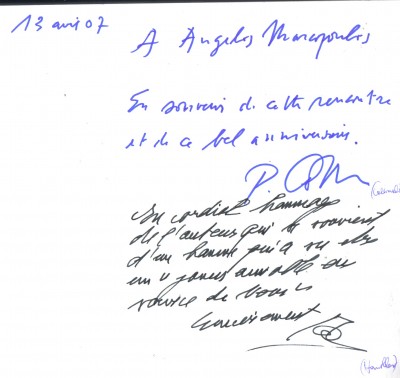 In Brief
In Brief  CoE Human Rights Commissioner Muizinieks: Protect Journalists from Attacks to Muzzle on Issues !
CoE Human Rights Commissioner Muizinieks: Protect Journalists from Attacks to Muzzle on Issues !
CoE Human Rights Commissioner Muizinieks: Protect Journalists from Attacks to Muzzle on Issues !
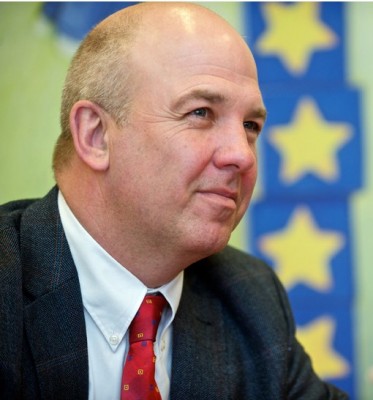
* "Journalists need Protection" from various "Attacks", "including in Europe", seeking "Censorship" against "Democracy", strongly declared the New PanEuropean Commissioner on Human Rights, Niels Muiznieks (2012-2018), just a few days after he replied to "EuroFora"s questions Internet Media Freedom and ECHR's Future (See: http://www.eurofora.net/newsflashes/news/coehumanrightscommissioneronwebmedia.html ), and the same Day that CoE's Committee of Ministers just started in Strasbourg to examine a crucial Semestrial meeting on ECHR judgements' application by all 47 Member States, including a review of numerous serious cases of Violations of Human Rights by Turkey (such as Torture, Murders, Arbitrary deprivations of Liberty, abusive Imprisonment, Harassments and/or Censorship, "Missing" People, etc, most Dating since the 1990ies, but partly "freezed" since 2009), notoriously pending for execution since too many years, in an interesting, well documented Viewpoint that "EuroFora" exceptionaly re-publishes, at variance to our general rule on Original only Journalism in News Reporting.
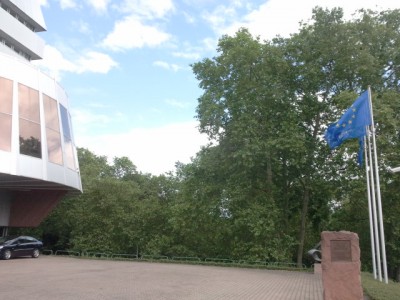
- The "intention" generaly is "to Shut them up and make them Stop doing their job, which can involve exposing Corruption, Abuse of power or Discrimination against various minorities. Media freedom is the lifeblood of a Democracy, as it is an essential prerequisite for other Freedoms as well, such as freedom of association or assembly", he denounced.
- Because "attacks on journalists are not like many other assaults, where the motive is frequently materialistic or racism. These are Political Attacks. As the OSCE Representative on Freedom of the Media, Dunja Mijatovic´, has recently written, “violence against journalists [..] remains a Special category of Crime, as it is a direct attack on Society and Democracy itself”.
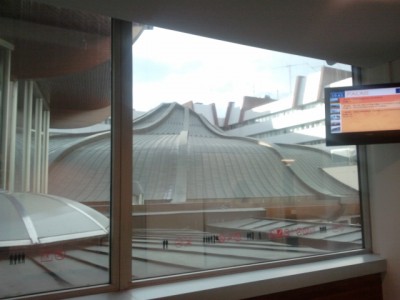
- That's why, all CoE's Member "States have a positive obligation to create a favourable environment for journalists to express their opinions without fear, no matter how uncomfortable those opinions may sometimes be to those with economic, cultural or political power", Muisnieks made it clear, citing the landmark "Dink v. Turkey judgment of the European Court of Human Rights", condemning Ankara on the ill-elucidated cold blood Murder of Armenian origin Web and paper Journalist Hrant Dink, (Comp. "EuroFora"s specific NewsReport on Dink's case at the ECHR, published since October 2010).
=> Therefore, "Governments and politicians need to signal very strongly that such Attacks are unacceptable and will not go unpunished. They need to initiate prompt, thorough and transparent Investigations and bring perpetrators to justice, where punishments should reflect the seriousness of this crime. If journalists have been threatened, the authorities should act quickly to protect them", CoE's New Human Rights Commissioner (2012-2018) stressed.
- Since, "even if a government does not engage in “old-fashioned” Censorship by screening and filtering media content, it can be involved in censorship if it does not take sufficient steps to combat violence against journalists. Impunity encourages repetition, which can be extremely damaging to free expression", he warned. For this reason, "a recent guidebook on the safety of journalists by the OSCE ... stresse(s) that “physical attacks and Threats of violence or Harm against journalists and members of their Family represent an extreme form of Censorship”.
- Indeed, "Journalism is a Dangerous profession, including in Europe", CoE's New PanEuropean Commissioner on Human Rights, responsible for 47 Countries, found on June 2012 :
- Among many other, older examples, only "since the beginning of this year (2012), journalists have suffered physical Attacks in Azerbaijan on a number of occasions, France, Germany, Greece, Italy, Latvia, Moldova, Montenegro, Romania and Russia.. ..What were these journalist-victims reporting on? In Azerbaijan, the story was the demolition of houses and evictions of residents for government sponsored urban redevelopment. In Romania and Russia, it was anti-government demonstrations. In France and Germany, it was Turkish-language media outlets reporting on the Kurdish minority in Turkey. In Italy, it was stories focusing on Mafia affairs. In Montenegro, it was a journalist probing shady dealings in a tobacco plant", (etc), he noted, pointing at the Diversity of "Hot" issues which may be covered by certain Media.
- "Often, the perpetrators of the attacks are unknown assailants, usually several masked men, but sometimes they have been riot police or state sponsored security guards". But "the attackers knew that their victims were journalists, who were sometimes wearing press badges or held cameras in their hands. In another case, the perpetrators mentioned the employer of the journalist as they beat him. In Latvia, in a brutally symbolic move, the assailants put a knife in the journalist’s mouth and sliced his cheek, grossly disfiguring him", he denounced.
- "A 1st Step is for Governments to treat violence targeting journalists as attacks against the core of our Democracies", and, therefore, "with the utmost Seriousness", Muiznieks urged.
- Because, f.ex., "those of us who witnessed the end of the Soviet Union remember well how glasnost’ or increased openness and Media liberalisation opened the floodgates for the emergence of Civil Society and political Pluralism" in Russia, he observed the Baltic-origin experienced European Top Official, as a Positive Change regarding Human Rights and Democracy, to be further developed and followed also elsewhere, mutatis-mutandis.
Main Menu
Accueil Press Deontology/Ethics 2009 Innovation Year EU endorses EuroFora's idea Multi-Lingual FORUM Subscribers/Donors FAQs Le Elxis licence Recherche avancée EuroFora supports Seabird newsitems In Brief European Headquarters' MAPs CoE Journalists Protection PlatformBRIEF NEWS
- 00:00 - 02.06.2021
- 00:00 - 18.10.2020
- 00:00 - 19.06.2020
- 00:00 - 18.05.2020
- 00:00 - 20.04.2020
- 00:00 - 02.02.2020
- 00:00 - 09.12.2019
- 00:00 - 27.11.2019
- 00:00 - 16.11.2019
Popular
- Yes, we could have prevented Ferguson riots says World Democracy Forum's Young American NGO to ERFRA
- Spanish People Elect CenterRIGHT Majority with 1st Party and Total of 178 MPs (6 More than the Left)
- Pflimlin's vision
- The European Athletic "Dream Team", after Barcelona 2010 Sport Championship Results
- Source Conseil d'Europe à ERFRA: Debatre Liberté d'Opposants à Loi livrant Mariage+Enfants à Homos ?
- Head of BioEthics InterGroup, MEP Peter Liese : "Embryonic stem cell research reaching its END" !?
- Spain: Jailed Turkish Terror suspect with Explosive,Drones,Chechen accomplices stirs Merah+ Burgas ?
- UN Head Ban Ki Moon at CoE World Democracy Forum : - "Listen to the People !"
Latest News
- Test Photos (f.ex.+ Invit to EU + Korea Peace meeting)
- EUOmbudsmen Conference 2022: Digital Gaps affect People's Trust threaten EF Project on EU Future ?
- French Election : Black Out on Virus, but Obligation for Fake 'Vaccines" Challenged
- Both French Presidential Candidates point at "Humanism" in crucial times...
- France : Zemmour = Outsider may become Game Changer in Presidential + Parliamentary Elections 2022
Statistics
Visiteurrs: 60265743Archive
Login Form
Other Menu
Pierre Pflimlin's visionary line : Honouring the Memory of the man who wanted to build Europe on the Mountains, based on Spirit !
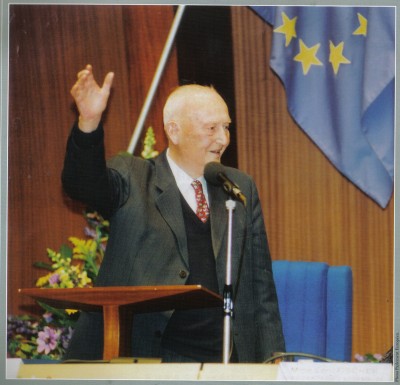
One of EuroFora's best inspirators is naturally Pierre Pflimlin :
We had a chance to personally meet the dynamic and experienced former President of both EU Parliament and CoE's Assembly, France's Prime Minister and Strasbourg's Mayor, only at his 90th anniversary, during an Historic speech at the Council of Europe, exceptionally full of people.
But his energetic figure looked more like a youngster of 19 years old, eager to win the Olympic games !..
Visionary, 2P was, from many points of view :
His daughter, Antoinette, Artist-decorator, and Senator Jung, President of a group of friends, confirmed us an Historian's revelation, that Pflimlin had initially the idea to build all European institutions (EU Parliament, Council of Europe, European Court of Human Rights, etc) at the spectacular heights of Oberhausbergen hills, with an eye-catching view of both French Vosges and German Black Forest Mountains, in the midst of a Forest : A real vision to create a brand New European Headquarters with a big ambition !
But, it seems, that "someone in Brussels" found that picture, precisely, too big for his taste, and threw a spanner on the works...
Pflimlin stroke back a Decade ago, at his Historic 1997 farewell speech :
He urged Europeans to find another, more substantial way, to lift Europe to more important Heights in Future :
- "On which basis can we imagine the birth of a great Europe ?", he asked.
"Certainly an Economic basis ! A solid market economy, meeting also the needs of social justice. A Political basis : Europe must become a strong Political Power, able to influence World's changes, naturally for Peace."
"But I believe that the essential foundation of a greater Europe should be of Spiritual nature : .... The great pacific Revolutions were Spiritual Victories" : They expressed "People's main motivation to live in a society with our Values of Liberty, Democracy, respect for Human Dignity".
"Then, the roadmap is ready : Yes, the foundation of the unity for a large Europe is the spiritual heritage, inspired by Christian Humanism and the Humanism of Renaissance, of Enlightenment, from which emerged a Civilisation focused on the Human person".
"Here is the task to be accomplished. It's very difficult".
"The Time approaches when I'll have to pass over the torchlight. God willing, this torch should enlighten the path of those who are going to build, tomorrow, the great Europe, marked by this Spirit".
(Extract from the Book "Pierre Pfilmin : Alsacian and European", 2007. Texts by Senator Louis Jung, by the long-time f. Director of Strasbourg's Newspaper DNA, Alain Howiller, and by f. EU Parliament's Press Director, Paul Collowald : See dedications, hand-written by the authors, the day the book for Pflimlin's 100th Aniversary was launched at Strasbourg's Press Club and European Parliamentary Association's headquarters, 13 April 2007).
